White7
On this page, you find all documents, package deals, and flashcards offered by seller White7.
- 203
- 0
- 0
Community
- Followers
- Following
203 items
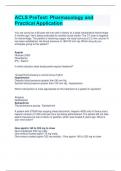
ACLS PreTest: Pharmacology and Practical Application Full-Function Score A+
ACLS PreTest: Pharmacology and Practical Application You are caring for a 66-year-old man with a history of a large intracerebral hemorrhage 2 months ago. He is being evaluated for another acute st ro ke. The CT scan is negative for hemorrhage. The patient is receiving oxygen via nasal cannula at 2 L/min, and an IV has been established. His blood pressure is 180/100 mm Hg. Which drug do you anticipate giving to this patient? Aspirin Glucose (D50) Nicardipiner tPA - Aspirin In which situation doe...
- Exam (elaborations)
- • 7 pages •
ACLS PreTest: Pharmacology and Practical Application You are caring for a 66-year-old man with a history of a large intracerebral hemorrhage 2 months ago. He is being evaluated for another acute st ro ke. The CT scan is negative for hemorrhage. The patient is receiving oxygen via nasal cannula at 2 L/min, and an IV has been established. His blood pressure is 180/100 mm Hg. Which drug do you anticipate giving to this patient? Aspirin Glucose (D50) Nicardipiner tPA - Aspirin In which situation doe...
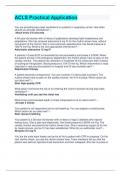
ACLS Practical Application Latest 2022 Package Deal
ACLS Practical Application You are providing bag-mask ventilations to a patient in respiratory arrest. How often should you provide ventilations? – About every 5-6 seconds A 45-year-old woman wi th a history of palpitations develops light headedness and palpitations. She has recieved adenosine 6 mg IV for the rhythm shown here, without conversion of the rhythm. She is now extremely apprehensive. Her blood pressure is 128/70 mm Hg. What is the next appropriate intervention?
- Exam (elaborations)
- • 3 pages •
ACLS Practical Application You are providing bag-mask ventilations to a patient in respiratory arrest. How often should you provide ventilations? – About every 5-6 seconds A 45-year-old woman wi th a history of palpitations develops light headedness and palpitations. She has recieved adenosine 6 mg IV for the rhythm shown here, without conversion of the rhythm. She is now extremely apprehensive. Her blood pressure is 128/70 mm Hg. What is the next appropriate intervention?

TNCC EXAM QUESTIONS AND ANSWERS PERFECT SOLUTION
TNCC EXAM 1. Preparation and Triage 2. Primary Survery (ABCDE) with resuscitation adjuncts (F,G) 3. Reevaluation (consideration of transfer) 4. Secondary Survey (HI) with reevaluation adjuncts 5. Reev aluation and post resuscitation care 6. Definitive care of transfer to an appropriate trauma nurse - Initial Assessment
- Exam (elaborations)
- • 9 pages •
TNCC EXAM 1. Preparation and Triage 2. Primary Survery (ABCDE) with resuscitation adjuncts (F,G) 3. Reevaluation (consideration of transfer) 4. Secondary Survey (HI) with reevaluation adjuncts 5. Reev aluation and post resuscitation care 6. Definitive care of transfer to an appropriate trauma nurse - Initial Assessment
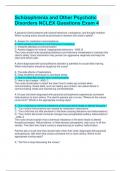
Schizophrenia and Other Psychotic Disorders NCLEX
Schizophrenia and Other Psychotic Disorders NCLEX Questions Exam 4 A paranoid client presents with bizarre behaviors, neologisms, and thought insertion. Which nursing action should be prioritized t o maintain this client's safety? A. Assess for medication noncompliance B. Note escalating behaviors and intervene immediately C. Interpret attempts at communication D. Assess triggers for bizarre, inappropriate behaviors - ANS: B The nurse should note escalating behaviors and intervene immediately t...
- Exam (elaborations)
- • 9 pages •
Schizophrenia and Other Psychotic Disorders NCLEX Questions Exam 4 A paranoid client presents with bizarre behaviors, neologisms, and thought insertion. Which nursing action should be prioritized t o maintain this client's safety? A. Assess for medication noncompliance B. Note escalating behaviors and intervene immediately C. Interpret attempts at communication D. Assess triggers for bizarre, inappropriate behaviors - ANS: B The nurse should note escalating behaviors and intervene immediately t...
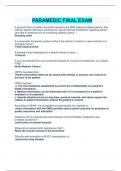
PARAMEDIC FINAL EXAM FIRST CLASS A
PARAMEDIC FINAL EXAM A protocol that is a written document signed by the EMS system's medical director that outlines specific directions, permissions, and sometimes prohibitions regarding patient c ar e that is rendered prior to contacting medical control. – Standing order If a paramedic transports a patient without the patient's consent or uses restraints in a wrongful manner
- Exam (elaborations)
- • 14 pages •
PARAMEDIC FINAL EXAM A protocol that is a written document signed by the EMS system's medical director that outlines specific directions, permissions, and sometimes prohibitions regarding patient c ar e that is rendered prior to contacting medical control. – Standing order If a paramedic transports a patient without the patient's consent or uses restraints in a wrongful manner
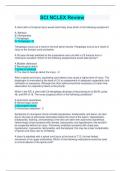
SCI NCLEX ALL IN ONE SOLUTION
SCI NCLEX Review A client with a C6 spinal injury would most likely have which of the following symptoms? A: Aphasia B: Hemiparesis C:Paraplegia D: Tetraplegia - D Tetraplegia occurs as a result of ce rvical spine injuries. Paraplegia occurs as a result of injury to the thoracic cord and below. A 30-year-old was admitted to the progressive care unit with a C5 fracture from a motorcycle accident. Which of the following assessments would take priority?
- Exam (elaborations)
- • 11 pages •
SCI NCLEX Review A client with a C6 spinal injury would most likely have which of the following symptoms? A: Aphasia B: Hemiparesis C:Paraplegia D: Tetraplegia - D Tetraplegia occurs as a result of ce rvical spine injuries. Paraplegia occurs as a result of injury to the thoracic cord and below. A 30-year-old was admitted to the progressive care unit with a C5 fracture from a motorcycle accident. Which of the following assessments would take priority?
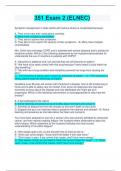
351 Exam 2 (ELNEC) Download For Excellent Grades
351 Exam 2 (ELNEC) Symptom management in older adults with serious illness is complicated because: A. They never take their medications correctly. B. Many have multiple comorbidities. C. They tend to ignore their symptoms. D. They like to over-report the severity of their symptoms. - B. Many have multiple comorbidities. Mrs. Smith has end-stage COPD and is admitted with severe dyspnea and is started on morphine sulfate. Which of the following statements by her husband demonstrates he understands...
- Exam (elaborations)
- • 8 pages •
351 Exam 2 (ELNEC) Symptom management in older adults with serious illness is complicated because: A. They never take their medications correctly. B. Many have multiple comorbidities. C. They tend to ignore their symptoms. D. They like to over-report the severity of their symptoms. - B. Many have multiple comorbidities. Mrs. Smith has end-stage COPD and is admitted with severe dyspnea and is started on morphine sulfate. Which of the following statements by her husband demonstrates he understands...
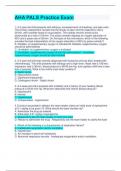
AHA PALS Practice Perfect Solution
AHA PALS Practice Exam 1. A 5-year-old child presents with lethargy, increased work of breathing, and pale color. The primary assessment reveals that the airway is open and the respiratory rate is 30/ min, with crackles heard on auscultation. The cardiac monitor shows sinus tachycardia at a rate of 165/min. The pulse oximeter displays an oxygen saturation of 95% and a pulse rate of 93/min. On the basis of this information, which of the following provides the best interpretation of the oxygen sat...
- Exam (elaborations)
- • 12 pages •
AHA PALS Practice Exam 1. A 5-year-old child presents with lethargy, increased work of breathing, and pale color. The primary assessment reveals that the airway is open and the respiratory rate is 30/ min, with crackles heard on auscultation. The cardiac monitor shows sinus tachycardia at a rate of 165/min. The pulse oximeter displays an oxygen saturation of 95% and a pulse rate of 93/min. On the basis of this information, which of the following provides the best interpretation of the oxygen sat...
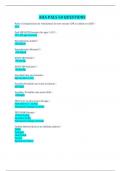
AHA PALS 50 Full Featured
AHA PALS 50 QUESTIONS Ratio of compressions to ventilations for two rescuer CPR on infant or child? – 15:2 Pedi SBP HOTN formula for ages 1-10?
- Exam (elaborations)
- • 4 pages •
AHA PALS 50 QUESTIONS Ratio of compressions to ventilations for two rescuer CPR on infant or child? – 15:2 Pedi SBP HOTN formula for ages 1-10?
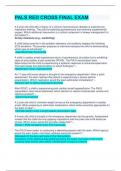
PALS RED CROSS FINAL EXAM PACKAGE DEAL
PALS RED CROSS FINAL EXAM A 5-year-old child with a history of a chronic neuromuscular disease is experiencing respiratory distress. The child is breathing spontaneously and receiving supplemental oxy gen. Which additional intervention is a critical component of airway management for this patient? – Airway clearance (e.g., suctioning) A child being cared for in the pediatric telemetry unit suddenly displays the following ECG waveform. The provider prepares to intervene because the child is dem...
- Exam (elaborations)
- • 7 pages •
PALS RED CROSS FINAL EXAM A 5-year-old child with a history of a chronic neuromuscular disease is experiencing respiratory distress. The child is breathing spontaneously and receiving supplemental oxy gen. Which additional intervention is a critical component of airway management for this patient? – Airway clearance (e.g., suctioning) A child being cared for in the pediatric telemetry unit suddenly displays the following ECG waveform. The provider prepares to intervene because the child is dem...
